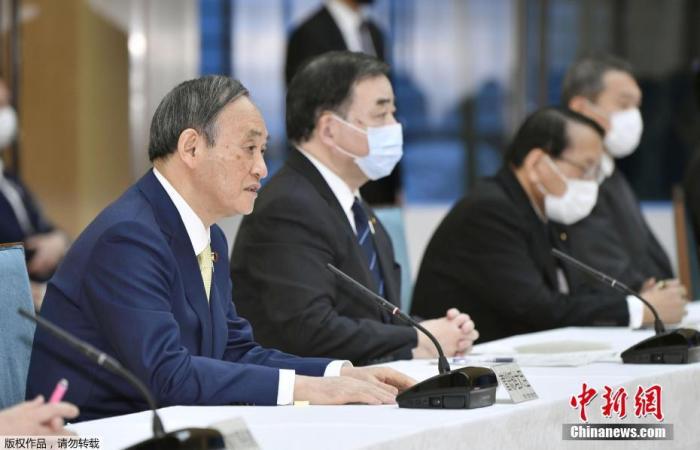China News Service, April 14th, South Korean media reported that the Japanese government officially decided to discharge nuclear waste water from the Fukushima Daiichi Nuclear Power Plant into the ocean, which was firmly opposed by the South Korean side.
South Korea’s Ministry of Foreign Affairs accused Japan of not providing sufficient information on nuclear waste water discharged from the sea, and called on Japan to transparently disclose information and accept verification.
At the same time, Japan’s move has triggered South Korea’s concerns about the safety of aquatic products. South Korean large supermarkets plan to continue not selling Nissan seafood.
On April 13, the Japanese government officially decided that the nuclear sewage from the Fukushima Daiichi Nuclear Power Plant will be discharged into the sea after being filtered and diluted.
The picture shows the Fukushima Daiichi Nuclear Power Plant in Japan on February 13.
strongly oppose! South Korea calls on Japan to transparently disclose information
An official from the South Korean Ministry of Foreign Affairs stated on the 13th that the Japanese government did not provide sufficient information to South Korea in its decision to discharge the wastewater from the Fukushima nuclear power plant to the sea.
The official said that the communication between South Korea and Japan directly related to the decision to discharge pollutants into the sea seems insufficient, and the South Korean side firmly opposes Japan's unilateral and sudden decision.
The official said that he thought that Japan would share information with South Korea and decided after a period of time, but he did not expect to make such a hasty decision.
In view of the fact that the decision to discharge pollutants into the sea is within the scope of its sovereignty, the South Korean government has previously worked to make Japan abide by international standards in the discharge process, transparently disclose information, and did not strongly object to it.
However, after Japan suddenly decided to discharge without providing the information requested by South Korea, South Korea expressed strong regret and called on Japan to transparently disclose information and accept verification.
On the morning of April 13, Japanese Prime Minister Yoshihide Suga held a cabinet meeting and officially decided to discharge the sewage from the Fukushima Daiichi Nuclear Power Plant into the sea.
The picture shows Japanese Prime Minister Yoshihide Suga (first from left) attending a cabinet meeting.
Strengthen the monitoring of marine nuclear pollution! Strictly grasp seafood safety
At the same time, Japan's decision to discharge pollutants into the sea has caused South Korea to worry about the safety of aquatic products.
South Korea’s Ministry of Oceans and Fisheries (Ministry of Maritime Affairs), Park Junyoung, held an emergency press conference on the 13th. Regarding the Japanese government’s announcement of discharging the sewage from the Fukushima nuclear power plant into the sea, the government will never compromise with any practices that threaten the health of the people and will take all feasible measures. Protect the marine environment and the safety of aquatic products.
The Ministry of Maritime Affairs plans to increase the number of radioactive material monitoring in 13 major sea areas including the eastern, southern waters and the coast of Jeju Road from the original 4 to 6; after the Japanese discharge of nuclear sewage, Korean ships are required to avoid calling at Fukushima as much as possible. , Miyagi, Aomori, Iwate and other places.
The Ministry of Maritime Affairs will also work with the Food and Drug Safety Department, the Maritime Police Agency and various local governments to strictly manage the safety of aquatic products, expand the implementation of investigations into suspected nuclear-contaminated sea areas and offshore marine products, and severely report falsely reporting the origin of aquatic products punishment.
Park Jun-young said that the Ministry of Maritime Affairs will improve the system for precise analysis and prediction of radioactive substances in seawater in order to quickly grasp the negative impact of Japanese nuclear sewage on South Korean waters.
Data map: South Korean people boycott Japanese goods.
Stop selling Nissan seafood! Major supermarkets in South Korea increase inspection efforts
In addition, Korean large supermarkets plan to continue not selling Nissan seafood.
After the Great East Japan Earthquake caused the Fukushima Daiichi Nuclear Power Plant accident, which triggered concerns about the safety of Nissan’s seafood products, large Korean supermarkets such as Emart, Lotte Mart, Homeplus and others have stopped selling Nissan’s seafood since 2011. Major domestic department stores The same measures have been taken from the same period.
Relevant persons in the industry said that in addition to government-level radionuclide testing, various large supermarkets also conduct radiation inspections on imported seafood products and will further increase product inspection efforts.

